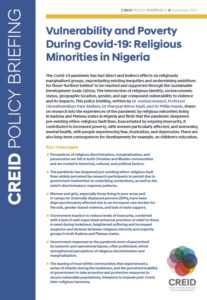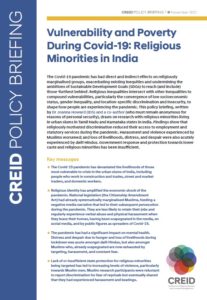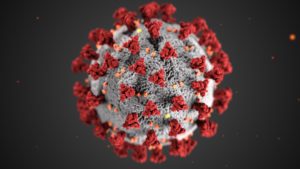This study, conducted between November 2020 and March 2021 in India and Nigeria, explored the direct and indirect effects of Covid-19 on religiously marginalised groups experiencing intersecting vulnerabilities.
The findings provide recognition of the impact of Covid-19 on targeting and encroachments faced by these groups in order to inform policy so that it includes their perspectives in building back better and promoting inclusive development. Policymakers need to understand both the direct and indirect impacts of Covid-19 in order to coordinate effective support and avert deepening marginalisation.
This research demonstrates how religious inequalities intersect with other inequalities of power – historical, structural, and socially determined characteristics (class, ethnicity, caste, gender, age) – to shape how people experience the Covid-19 pandemic. Both India and Nigeria manifest high levels of authoritarianism, an absence of press freedom, targeting of religiously marginalised groups, and unequal access to public services and the protection of the state by religiously marginalised groups, according to geographic location.
The findings of this report reveal the appalling everyday realities as well as the great courage of religious minorities living in poverty during the pandemic. Greater sensitivity to the critical intersection of vulnerabilities is essential for the longer-term recovery of these groups, who otherwise face slipping deeper into intergenerational poverty. Deepening poverty and proliferating ethno-religious injustices are fuelling tensions and conflict, and the risks of neglecting these issues are immense.
See also…
The evidence we can’t ignore: religious inequality and Covid-19 in India, Nigeria and beyond (Event)
Vulnerability and Poverty During Covid-19: Religious Minorities in India (Policy Briefing)
Vulnerability and Poverty During Covid-19: Religious Minorities in Nigeria (Policy Briefing)
Discrimination and violence rife for religious minorities during Covid (Event)



